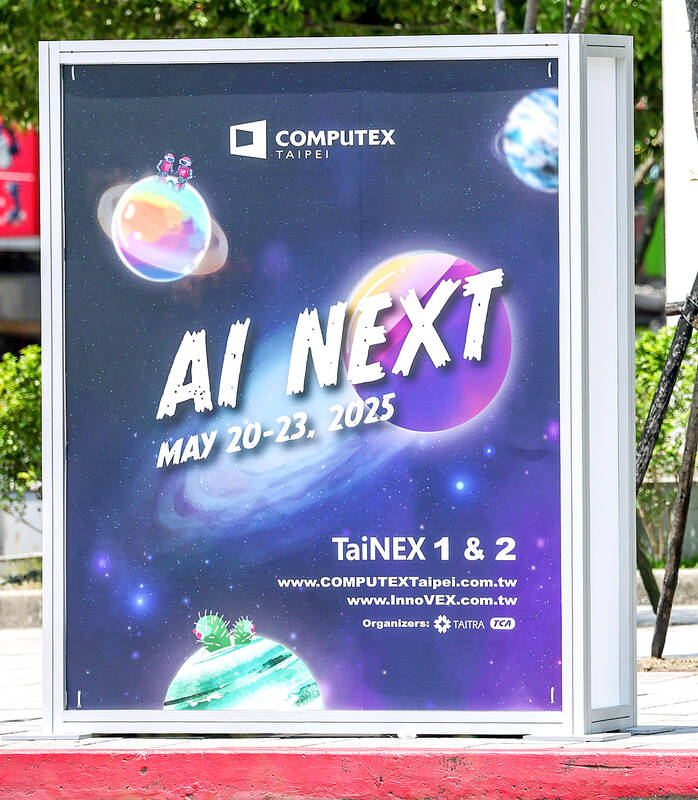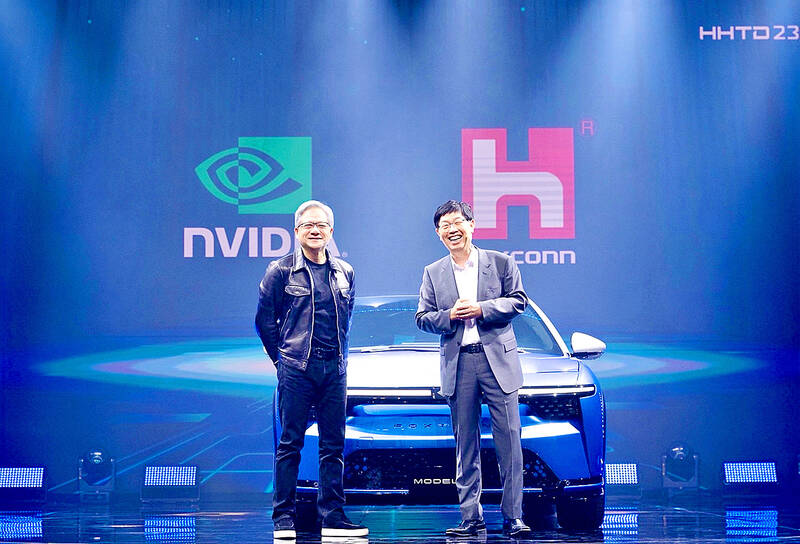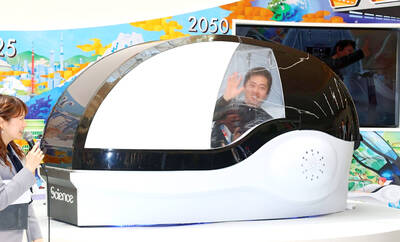Computex, Asia’s biggest electronics conference, kicked off Monday in Taipei, and as in years past drew industry chieftains from Nvidia Corp.’s Jensen Huang and Qualcomm Inc.’s Cristiano Amon to Young Liu of Foxconn, which makes the bulk of the world’s iPhones and Nvidia servers. But while last year’s event was a celebration of the post-ChatGPT AI boom, executives this time are likely grappling with the uncertainty of the Trump administration’s effort to reshape the global trade order — disrupting a decades-old model for tech manufacturing.
This year’s exhibition will of course feature the hardware required to bring artificial intelligence to life. Apart from Nvidia chips, that includes server racks assembled by Hon Hai Precision Industry Co., also known as Foxconn; power components from Delta Electronics Inc.; and datacenter cooling systems from Asia Vital Components Co. But while they tout new products onstage, these companies are also confronting profound questions about the US administration’s tariff regime.
THE SHIFTING GEOGRAPHY OF CHIP MANUFACTURING

Photo: AFP 照片:法新社
Trump wants manufacturing back home. To that end, the White House has secured major chipmaking commitments, most notably an additional US$100 billion investment from Taiwan Semiconductor Manufacturing Co. As TSMC builds out its Arizona operations with more production lines, supply chain players are also joining it in the US — and accelerating those plans because of the new tariffs.
Asia’s biggest electronics companies may also find new opportunity in the Middle East. In the week before Computex, a US delegation led by the president — and including tech luminaries Huang, Elon Musk and OpenAI co-founder Sam Altman — visited Saudi Arabia’s Riyadh with lofty promises of new trade deals. Alongside a relaxation of AI chip export rules, the visit underlines the Middle East’s growing importance as a player in the AI field.
“The new focus on export rules around China and Huawei means more opportunity for Taiwan,” said Taipei-based industry analyst Dan Nystedt.

Photo: AFP 照片:法新社
AI’S QUESTIONABLE PAYOFF
From Advanced Micro Devices Inc. to Nvidia and Qualcomm, the development of generative artificial intelligence was heralded at Computex last year as comparable to the advent of the Internet.
Consumers haven’t responded with the same enthusiasm. Smartphone shipments grew by only 2.4 percent and PCs by an even slimmer 1.8 percent over the holiday quarter, according to industry tracker IDC. The promises from the likes of Samsung Electronics Co. about how transformative AI would be in day-to-day life have not come to pass. Apple Inc. hasn’t even rolled out its full AI suite for iPhones yet. So executives at Computex will face questions about when the payoff is supposed to come.

Photo courtesy of Foxconn 照片:鴻海提供
They’ll also have to address concerns about an AI bubble. Investment from the biggest US internet firms remains elevated. Yet Microsoft Corp. has pulled back on some of its expansion plans, and Alibaba Group Holding Ltd.’s Joe Tsai warned against building vast data centers without knowing their purpose.
INTEL’S NEW MAN IN CHARGE
Lip-Bu Tan, the newly appointed chief executive officer of Intel Corp., won’t be at Computex in a formal capacity as his company won’t conduct its traditional keynote address. But he’ll likely be doing more meetings than anyone at the show as he continues his survey of partners and customers.
Tan is currently weighing options to reform the storied US chipmaker. Intel is still the biggest provider of PC and server processors, though it’s losing market share.
At and around Computex, he’ll work to reassure and recruit partners for the effort to close ground on Nvidia and TSMC.
FOXCONN’S DEBUT
Foxconn is making an unusually prominent appearance. Chairman Liu will host a keynote presentation on Tuesday, likely underscoring its growing role as an AI server assembler. In previous iterations of the show, the company has been represented by subsidiaries like Ingrasys Technology Inc.
Foxconn is working to diversify its revenue away from assembling smartphones and other consumer electronics. It’s developed an automotive division and hopes to collect bigger orders for electric vehicles. The company is also keen on advancing robotics.
“Of course AI plus robots, AI plus robots,” Liu said about the focus at Computex.
WHAT’S NEXT FROM NVIDIA
The Nvidia boss remains a larger-than-life personality in Taiwan, with crowds following his every move. Investors will be keen to hear more about the chip designer’s strategy to expand its reach.
In his keynote speech yesterday, Huang announced that his company has selected Beitou Shilin Science Park in Taipei for its new Taiwan office and its new overseas headquarters, called Nvidia Constellation, putting an end to months of speculation.
The company has been forthcoming with plans to upgrade its AI chips on a roughly annual basis, and Huang has also talked about the potential of AI in the robotics industry.
(Bloomberg)
亞洲最大的電子產品展會Computex(台北國際電腦展)週一在台北揭幕,一如往年,吸引眾多業界領袖出席,包括輝達的黃仁勳、高通的克里斯蒂亞諾.艾蒙,以及富士康的劉揚偉(全球大部分的iPhone和輝達的伺服器皆是由富士康生產)。雖然去年的Computex展現了ChatGPT出現後百花齊放的人工智慧產業,但今年這些公司高層可能正亟思如何應對川普政府所帶來的不確定性——川普欲重塑全球貿易秩序,數十年來的科技業製造模式將因此被打破。
今年的展覽想當然耳將展示實現人工智慧所需的硬體。除了輝達晶片外,還包括鴻海精密工業有限公司(又名富士康)組裝的伺服器機櫃、台達電子公司的電源元件,以及奇鋐科技公司的資料中心冷卻系統。然而,儘管他們在台上推銷新產品,這些公司也面臨美國政府新關稅措施所帶來的深刻質疑。
晶片製造地點轉移
川普希望製造業回歸美國本土。為此目的,白宮已獲晶片製造的重大投資,最引人注目的是台積電的1000億美元加碼投資。隨著台積電在亞利桑那州擴建更多生產線,一些供應鏈夥伴也跟著到美國設廠——並由於新的關稅而加快了腳步。
亞洲最大的一些電子公司也有可能在中東找到新的機會。在Computex開幕前一週,由美國總統川普率領的美國代表團(其中包括科技界巨頭黃仁勳、伊隆.馬斯克及OpenAI共同創辦人山姆.阿特曼)訪問了沙烏地阿拉伯利雅德,並承諾簽署新的貿易協議。除了放寬人工智慧晶片出口規定外,此行次還凸顯出中東在人工智慧領域日益重要的角色。
常駐台北的產業分析師丹.奈斯泰德表示:「針對中國和華為的出口管制的新規定,意味台灣將會有更多機會」。
人工智慧的報酬率有疑慮
從超微半導體公司(AMD)到輝達和高通,生成式人工智慧的發展,在去年的Computex中被譽為可比擬網路的問世。
但消費者的反應卻不那麼熱情。據產業調查機構國際資料公司(IDC)稱,假日購物季智慧型手機的出貨量僅成長2.4%,個人電腦出貨量更是只有1.8%的成長率。三星電子等公司對人工智慧將改變日常生活的承諾尚未實現。蘋果甚至尚未推出適用於iPhone的完整AI套件。因此,齊聚Computex的產業高階主管將面臨何時能回本的問題。
他們還必須化解人工智慧泡沫化的疑慮。美國最大的一些網路公司對人工智慧的投資仍居高不下。然而,微軟公司已撤回部分擴張計畫,阿里巴巴集團控股有限公司的蔡崇信則警告,不要在不清楚用途的情況下建造大型資料中心。
英特爾的新舵手
英特爾公司新任執行長陳立武將不會以正式身分出席Computex,因為英特爾公司在這次不會發表傳統的主題演講。但隨著他對合作夥伴及客戶持續進行了解,他參與的會議可能會比電腦展中任何人還要多。
陳立武目前正權衡方案,要對這家歷史悠久的美國晶片製造商進行改革。英特爾的市占率雖正在下降,但英特爾仍是最大的個人電腦及伺服器之處理器的供應商。
在Computex及其周邊地區,他將努力安撫及招募合作夥伴,以設法追趕輝達和台積電。
富士康初登場
富士康的亮相異常引人注目。董事長劉揚偉將於今日主持一場主題演講,可能強調其作為人工智慧伺服器組裝廠商日益重要的角色。之前的電腦展,富士康是由鴻佰科技等子公司代表參加。
富士康正努力實現收益多元化,不再只依賴組裝智慧型手機和其他消費性電子產品。該公司已成立汽車部門,並希望獲得更多電動車訂單。該公司也熱衷推動機器人技術的發展。
劉揚偉在談到Computex的重點時表示:「當然是人工智慧加機器人,人工智慧加機器人」。
輝達的下一步計畫
輝達老闆黃仁勳在台灣是一位傳奇人物,他的一舉一動都廣受矚目。投資人渴望對這家晶片設計公司擴大影響力的策略有更多了解。
黃仁勳在昨天的主題演講中宣布,輝達已選擇台北市的北投士林科學園區作為台灣的辦公室新址及海外總部,名為 Nvidia Constellation,讓數月來的各方猜測塵埃落定。
該公司計劃大約每年升級一次其人工智慧晶片,黃仁勳也談到了人工智慧在機器人產業的潛力。
(台北時報林俐凱編譯)

A: Apart from megahit “KPop Demon Hunters,” what else is worth watching? B: The new shows featuring four top-tier actors – Xiao Zhan, Wang Yibo, Yang Yang and Li Xian — are all popular. A: Yang’s TV drama, “The Immortal Ascension,” is definitely one of the summer sizzlers. Some praise it as the Eastern edition of the glorious “Harry Potter” series. B: Yeah, the costume fantasy drama is about a young man’s journey to immortality. All the magic powers and magical tools in the show are just stunning. A: Let me go stream it now. I wanna

An automated human washing machine was one of the highlights at the Osaka Kansai Expo, giving visitors a glimpse into the future of personal hygiene technology. As part of the event, 1,000 randomly selected visitors were given the chance to try out this cleansing system. The machine operates as a capsule-like chamber where warm water filled with microscopic bubbles gently washes away dirt. The 15-minute process also includes a drying phase, removing the need for users to dry themselves manually. Equipped with advanced sensors, the device monitors the user’s biological data, such as their pulse, to adjust water temperature and other settings

Britain’s National Gallery announced on Sept. 9 that it will use a whopping £375m (US$510m) in donations to open a new wing that, for the first time, will include modern art. Founded in 1824, the gallery has amassed a centuries-spanning collection of Western paintings by artists from Leonardo da Vinci to J.M.W Turner and Vincent van Gogh — but almost nothing created after the year 1900. The modern era has been left to other galleries, including London’s Tate Modern. That will change when the gallery opens a new wing to be constructed on land beside its Trafalgar Square site that is currently

Firefighters might face an increased risk of developing “glioma,” a type of brain cancer, due to certain chemicals encountered on the job. A recent study analyzed glioma cases and found clear connections between the genetic patterns of affected firefighters and their exposure to these harmful substances. The study found that firefighters exhibited significantly higher levels of specific mutational signatures in their glioma cells compared to individuals in other occupations. These signatures — unique patterns of genetic changes in DNA — help scientists trace the source of mutations. Earlier research has associated these mutations with certain chemicals found in fire